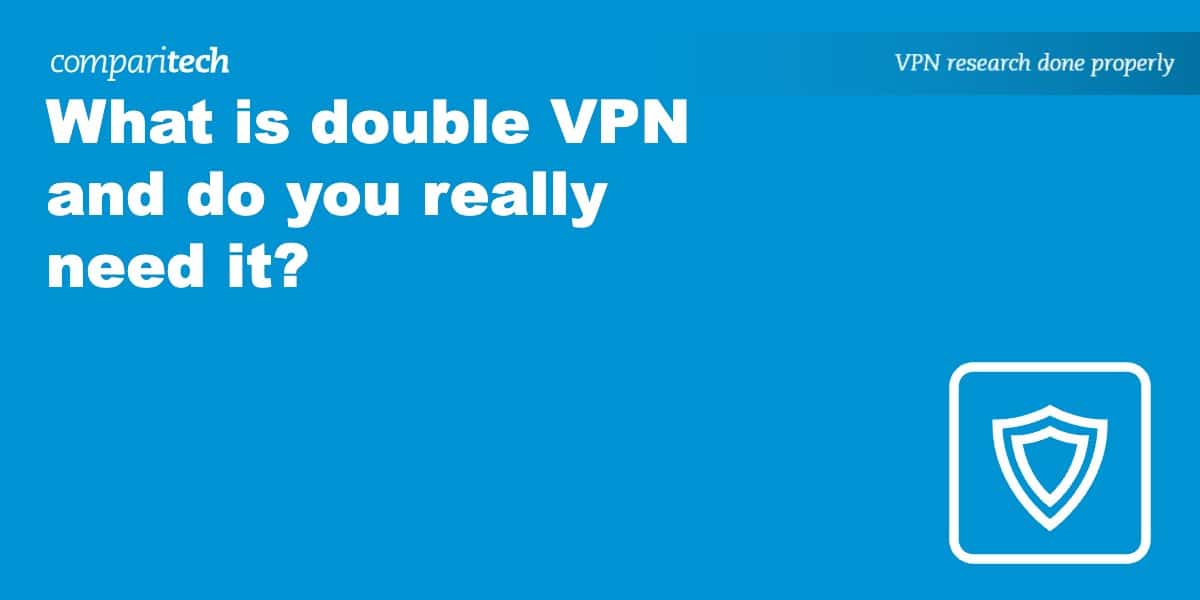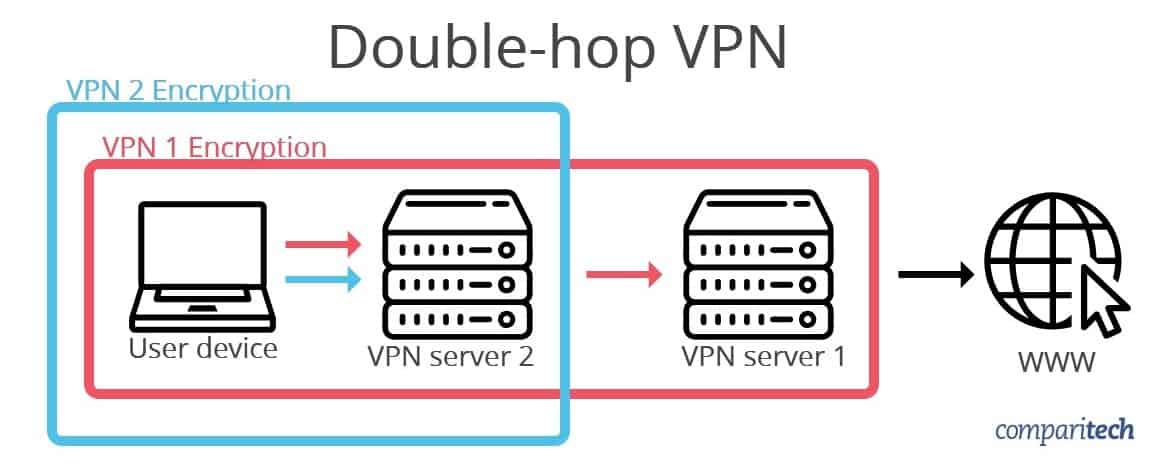A double VPN setup works more or less the same as a normal VPN connection with a couple of key differences:
- Internet traffic passes through two VPN servers instead of one
- Internet traffic is encrypted twice
Double VPNs are also known as double-hop, multi-hop, cascading, nested, or chained VPNs.
So what are the benefits of a double VPN and when should you use it? How do you set it up and which providers offer it? We’ll answer all these questions in this article.
What is a double VPN?
A normal VPN encrypts data sent to and received from the internet so that no third parties can decipher it. The data is passed through an intermediary server in a location of the user’s choosing, replacing their IP address with that of the VPN server.
The process for outgoing data on a normal VPN looks like:
- Data is encrypted on the end-user device (smartphone, laptop, etc)
- Encrypted data is sent to the VPN server
- Encrypted data is decrypted on the VPN server
- Data is sent to the destination website, app, or online service
Incoming data simply reverses this process so that it is encrypted on the server and decrypted on the end-user device.
A double VPN adds a second VPN server in the mix, as well as a second layer of encryption. The process for outgoing data looks like this:
- Data is encrypted on the end-user device
- Encrypted data is encrypted a second time on the end-user device
- Twice-encrypted data is sent to the first VPN server
- The second layer of encryption is removed by the first VPN server
- Encrypted data is sent to the second VPN server
- The first layer of encryption is removed and the data is fully decrypted
- Data is sent to the destination website, app, or online service
Incoming data goes through the same process in reverse. A layer of encryption is applied at each server and both are decrypted on the end user device.
This “nested” double VPN is the safest and most private configuration. However, some VPN providers and administrators don’t encrypt data twice on the end-user device.
Instead, a single layer of encryption is applied to outgoing traffic. It’s removed once it reaches the first VPN server, then the second round of encryption is applied before being sent to the second server. This method only offers a single layer of encryption at any one point and allows both servers to view unencrypted traffic, so we don’t recommend such a setup. It does very little for privacy or security.
It’s possible to add more servers and layers of encryption to create triple VPN or quadruple VPN setups, a method called VPN server chaining or VPN server cascading.
Which VPNs offer double VPN connections?
NordVPN is our top recommendation if you’re looking for a single provider that offers double VPN connections. You can simply choose from a list of available double VPN server locations right in the app. At the time of writing, double VPN is available in eight countries, all of which are in North America and Europe, plus one in Taiwan.
BEST DOUBLE VPN:NordVPN is a solid all-around choice with good speeds, strong security, and the ability to unblock region-locked content. It comes with a 30-day money-back guarantee.
Double VPN with different VPN providers
However, if you want to maximize privacy, you should use two different VPN providers.
Why?
NordVPN doesn’t store logs, but if it one day goes rogue and decides to record everything you do online, it won’t matter if you’re using double VPN. If one company owns both VPN servers, it can piece together your online activity despite the added security. It’s worth noting that we regard NordVPN as a trustworthy provider and such a scenario is unlikely.
Setting up a double VPN with two providers ensures that no single party can monitor both your IP address and online activity.
Using two VPN apps isn’t difficult when it works, but it can take a fair bit of configuration and troubleshooting. VPN apps can conflict with each other, especially if they’re using the same protocol and virtual network cards. You might try setting up one VPN on your device and one on your wi-fi router or virtual machine.
I was able to set up a double VPN with NordVPN and IPVanish using both apps on a single device, for example, but some other combinations didn’t pan out so well. I simply launched both apps and connected to one, then the other. One provider’s server can see my device, and the other can see what I’m doing online, but neither can do both, effectively making my connection anonymous.
Do I need double VPN? What are the benefits?
Probably not. But there are some scenarios when more security is beneficial.
A double VPN adds some security to a VPN connection, but it’s mostly redundant. The idea is that if the security key for one server is compromised, the data will still be encrypted for the second server and unreadable to third parties.
The other major benefit is that no one VPN server can see both the original source and the ultimate destination of internet traffic. For example, the first VPN server can see data coming from your smartphone, but it can’t see past the second VPN server to look at what websites you visit. Conversely, the second VPN can see what website you’re visiting, but the source is the previous VPN server, rather than your smartphone.
NordVPN recommends its double VPN feature to journalists, political activists, and those living under heavy internet surveillance.
What are the disadvantages of double VPN?
Double VPN connections tend to be quite a bit slower due to the extra server that your data must pass through.
It’s also more resource-intensive for your smartphone or laptop, which has to encrypt and decrypt all the data twice. Low-powered devices might suffer greater decreases in speed as a result.
Providers like NordVPN that offer double VPN connections don’t allow you to link together any servers or locations you want. Because they are static configurations, you’ll have to choose from a much smaller list of preset options.




